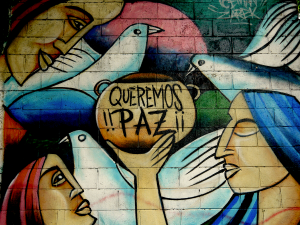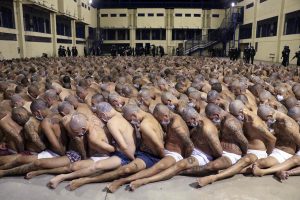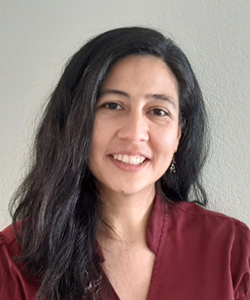R. Elizabeth (Eli) Velásquez Estrada (Latina/Latino Studies) is a 2022–2023 HRI Campus Faculty Fellow. Velásquez Estrada’s book in progress, tentatively titled Intersectional Justice Denied: Negative Peace and Persisting Violence in Post-Peace Accords El Salvador, draws on intersectional feminist theory to examine the central paradoxes of El Salvador’s post-war peacemaking practices. Incorporating ethnographic research with male gang members and their female relatives, who the state calls El Salvador’s “social plague,” the book explores the contradictions of male gang members who are simultaneously peacemakers and purveyors of gender violence.
Learn more about HRI’s Campus Fellowship Program, which supports a cohort of faculty and graduate students through a year of dedicated research and writing in a collaborative, interdisciplinary environment.
What is unique about your research on this topic?

My book, Intersectional Justice Denied: Negative Peace and Persisting Violence in Post-Peace Accords El Salvador, elucidates El Salvador’s highly gendered understanding of peace and practices of peacemaking. It explores how women relatives of male gang members engage in a complex and, at times, conflicted allyship with their relatives’ peacemaking efforts. In 2012, rival gangs negotiated a truce with the state that reduced homicidal violence from nearly 15 to 5 a day. While gangs and the state celebrated homicidal violence reduction as peace,
El Salvador had one of the world’s highest rates of femicidal violence. Women relatives of male gang members, who live in poverty exacerbated by neoliberal economic policies and gendered violence, have critiqued this peacemaking as a “masculinist peace.” My book expands the literature on peace-building and endemic violence by interrogating masculinist understandings of peace and practices of peacemaking in “post-war societies” like El Salvador.
What drives your interest in this research?
The question of how to transition society from war and endemic violence to peace has been close to my heart since I was a child. I grew up in a working-class neighborhood in the capital city of San Salvador, El Salvador, and lived through the 12-year Civil War, which left over 75,000 dead and thousands in exile. During and after this trying time, I witnessed violence in the streets and at my home. This was a painful lesson that the 1992 Peace Accords, which ended the military conflict, did not guarantee an end to social conflict or other forms of widespread violence. These experiences have fueled my passion for understanding logics and structures that sustain violence in order to produce knowledge that could be used towards a just peace.

How has the fellowship seminar impacted the way you approach your research?
Being in conversation with scholars across disciplines has been a wonderful, thought-provoking, and intellectually stimulating
experience. The HRI seminar is a space of interdisciplinary dialogue and cross-pollination of ideas that has enriched my knowledge about the exciting work co-fellows are doing and helped me reflect on potential aspects of my work that I had not previously considered. Through the HRI seminar, I have witnessed how interdisciplinary work births a more robust scholarship. The HRI seminar has inspired me to center interdisciplinarity as a model for my future research.
